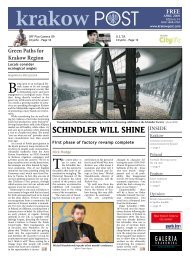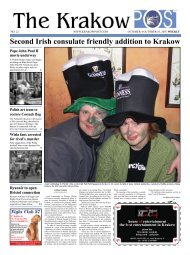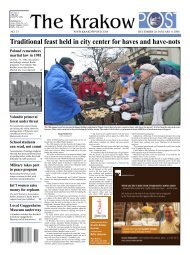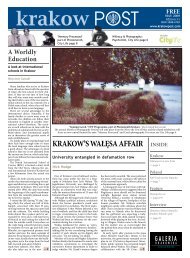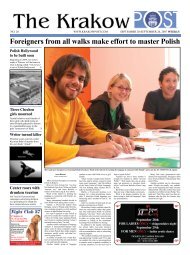November of memory: Poland remembers those who ... - Krakow Post
November of memory: Poland remembers those who ... - Krakow Post
November of memory: Poland remembers those who ... - Krakow Post
You also want an ePaper? Increase the reach of your titles
YUMPU automatically turns print PDFs into web optimized ePapers that Google loves.
NOVEMBER 1-NOVEMBER 7, 2007<br />
A L T E R N A T I V E C O N S U M E R The <strong>Krakow</strong> <strong>Post</strong> 13<br />
Fire in the mouth: <strong>Poland</strong>’s<br />
bootleg vodka tradition<br />
CC:2.5:Bartosz Senderek<br />
When a Pole asks a foreigner what he associates with <strong>Poland</strong>, he almost always hears the same answer: strong vodka.<br />
Kinga Rodkiewicz<br />
STAFF JOURNALIST<br />
When a Pole asks a foreigner what he associates<br />
with <strong>Poland</strong>, he almost always hears the same<br />
answer: strong vodka.<br />
The popularity <strong>of</strong> Polish alcohols is connected<br />
with a long history <strong>of</strong> making alcoholic drinks and<br />
with recipes handed down for generations.<br />
For centuries, Polish people have produced<br />
homemade alcoholic drinks. The technology <strong>of</strong><br />
producing vodka came to <strong>Poland</strong> in the 13th and<br />
14th centuries, thanks to Arabian and Italian merchants.<br />
The first written document about vodka<br />
dates to 1405, from a court in Randomizer.<br />
The golden age for the alcohol industry developed<br />
in the 16th Century when <strong>Poland</strong> became<br />
known as Europe’s granary.<br />
Corn production was so high that surpluses not<br />
used for food and alcohol production were exported<br />
to western Europe. In that era, each noble<br />
family produced its own unique liquor made from<br />
different fruits and herbs.<br />
Almost every male convent also produced alcoholic<br />
drinks. Even the peasants, especially along<br />
the Polish borderland, produced their own alcohols;<br />
the most popular were made from quince and<br />
wild strawberries.<br />
During the 17th Century, <strong>Krakow</strong> was the center<br />
<strong>of</strong> vodka production. The alcohol was exported<br />
to Silesia, and then to what is now the Czech Republic,<br />
Germany and Austria.<br />
In 1782 Jan Baczewski opened the first big distillery<br />
in Lviv, which produced vodka and some<br />
liquors. The label stated: “The only vodka which<br />
is as good as Baczewski’s vodka is the Russian alcohol<br />
<strong>of</strong> Peter Smirn<strong>of</strong>f from Moscow.”<br />
The Smirn<strong>of</strong>f label contained the same statement<br />
about Baczewski’s vodka. In Communist<br />
<strong>Poland</strong> after World War II, it was difficult to buy<br />
a bottle <strong>of</strong> good vodka because <strong>of</strong> the limitation<br />
created by alcohol rationing coupons.<br />
In response, many Poles produced homemade<br />
alcohol. However, <strong>those</strong> <strong>who</strong> manufactured homemade<br />
vodka were said to be enemies <strong>of</strong> the state<br />
and were targets <strong>of</strong> TV and newspaper campaigns.<br />
<strong>Post</strong>ers from that era depicted old, hunched-over<br />
men with eyeglasses and walking sticks in emaciated<br />
hands.<br />
The poster said: “Homemade vodka is the cause<br />
<strong>of</strong> blindness.” Police raids destroyed the home distilleries,<br />
and the <strong>of</strong>fenders were arrested and jailed.<br />
The most popular drinks in the People’s Republic<br />
<strong>of</strong> <strong>Poland</strong> were liquors made from caraway, anise,<br />
barberry, mint, blackberries and ginger. Other<br />
drinks included hunter vodka, peach brandy, pear<br />
brandy, juniper vodka and many others.<br />
Today, the best-known homemade alcohol may<br />
be plum brandy from Lacko in southeast <strong>Poland</strong>.<br />
First the drinker notices the tempting smell <strong>of</strong><br />
the plums. When he drinks a glass, he feels the fire<br />
in his mouth and a great flavor as well. Then the<br />
delightful warmth spreads into his body.<br />
“Plum brandy gives vim and blushes cheeks,”<br />
a label says. But one has to be careful how many<br />
glasses he drinks. The sweet homemade brandy is<br />
75 percent alcohol.<br />
In 1992, the heritage conservator (a person <strong>who</strong><br />
is responsible for the preservation and renovation<br />
<strong>of</strong> monuments) acknowledged the Lacko brandy<br />
as a national cultural landmark.<br />
According to documents dating to 1698, the<br />
brandy story begins with the people <strong>of</strong> Lacko<br />
growing plum trees.<br />
Serfs picked the plums and delivered them to<br />
the manor, where the fruits were used to produce<br />
alcohol. Lacko’s golden age began in 1882 when<br />
a Jewish family rented a parish ground and built<br />
a distillery.<br />
From 1882 to 1912, Samuel Grossbard owned<br />
the company. In 1912 a record 15,000 liters <strong>of</strong><br />
plum brandy was produced.<br />
The brandy was delivered to neighboring shops<br />
with a label certifying it as a high-quality drink.<br />
From 1960 to 1980, Henry Maciuszek and Joseph<br />
Biernacki, headmasters at the local primary school,<br />
created the distinctive labels. They can still be seen<br />
on the web site: www.sliwowica.net.pl<br />
On a nationwide scale, the quality <strong>of</strong> Lacko<br />
brandy became well known thanks to Inkas Ferber,<br />
<strong>who</strong> married Grossbard’s daughter. Ferber used<br />
only the best fruits and well-made equipment, including<br />
oak casks in which the brandy matured.<br />
At that time, alcohol was exported mainly to<br />
Palestine.<br />
When WWII broke out and Jews were arrested,<br />
alcohol production collapsed in <strong>Poland</strong>. But soon<br />
after the war ended, people started to make their<br />
alcohol again.<br />
Since 2004, the process has been celebrated at<br />
the European Fest <strong>of</strong> the Plum Brandy and Picking<br />
Fruit.<br />
The biggest attraction <strong>of</strong> this day is a stand<br />
where everyone can see the process <strong>of</strong> plum brandy<br />
production. According to a 2006 Polish law,<br />
producing plum brandy – as well as other homemade<br />
alcohol drinks – is a crime unless the distillery<br />
is properly registered.<br />
Franciszek Mlynarczyk, mayor <strong>of</strong> Lacko, has<br />
helped write a law that proposes the production <strong>of</strong><br />
homemade alcohols.<br />
“Our fruit growers produce 5,000 liters <strong>of</strong> plum<br />
brandy a year,” Mlynarczyk told Dziennik. “The<br />
Internal Revenue wants me to denounce the people<br />
<strong>who</strong> produce the brandy. The police do nothing because<br />
in Lacko everybody knows each other.”<br />
Actually, the Ministry <strong>of</strong> Agriculture and Finance<br />
organized a commission to prepare the rules<br />
<strong>of</strong> production and retail trade for the home-made<br />
alcohols.<br />
However, the act to legalize domestic alcohols<br />
hasn’t been enacted yet.<br />
That’s why homemade Lacko brandy cannot be<br />
bought at a shop.<br />
Jacob, a college student from Lacko, said:<br />
“Only trustworthy people <strong>who</strong> know the right<br />
time and place can obtain a bottle. It costs 45 to<br />
50 zloty.”<br />
Opponents <strong>of</strong> legalization <strong>of</strong> homemade alcohols<br />
say they are dangerous to health. In comparison<br />
to national companies in which there are some<br />
quality controls, the lack <strong>of</strong> standards for homemade<br />
production is the main cause <strong>of</strong> concern.<br />
Even good bootleg vodka may contain some<br />
alcohols that are said to be carcinogens, or cancer<br />
agents.<br />
There is also a possibility <strong>of</strong> methanol contamination.<br />
Methanol even in minimal concentrations<br />
can cause blindness and death.<br />
However, plum brandy gourmets hope that the<br />
government, following a Balkans example where<br />
homemade alcohol is legal, will legalize it in <strong>Poland</strong>.<br />
Then there will be no obstacles to buying it<br />
in the shops and feeling from time to time that fire<br />
in the mouth.<br />
EPE Translations<br />
English - Polish - English<br />
Agency providing translation services for<br />
companies working<br />
in multicultural environment as well as for<br />
private individuals.<br />
Deliver standard, technical and sworn<br />
translations at competitive prices.<br />
Also provide interpreters located in<br />
Ireland, UK and <strong>Poland</strong>.<br />
Check out www.epetranslations.com<br />
tel: (0048) (0) 12 4212300<br />
FOR PERMANENT,<br />
TEMPORARY AND<br />
CONTRACT STAFF<br />
IN IRELAND & UK<br />
• Ireland<br />
tel: (00353) 45 883420<br />
e-mail: claire@issrecruitment.com<br />
• Manchester, UK<br />
tel: (0044) 0 161 9090050<br />
e-mail: issrecruitment@yourcomms.net<br />
www.issrecruitment.com




